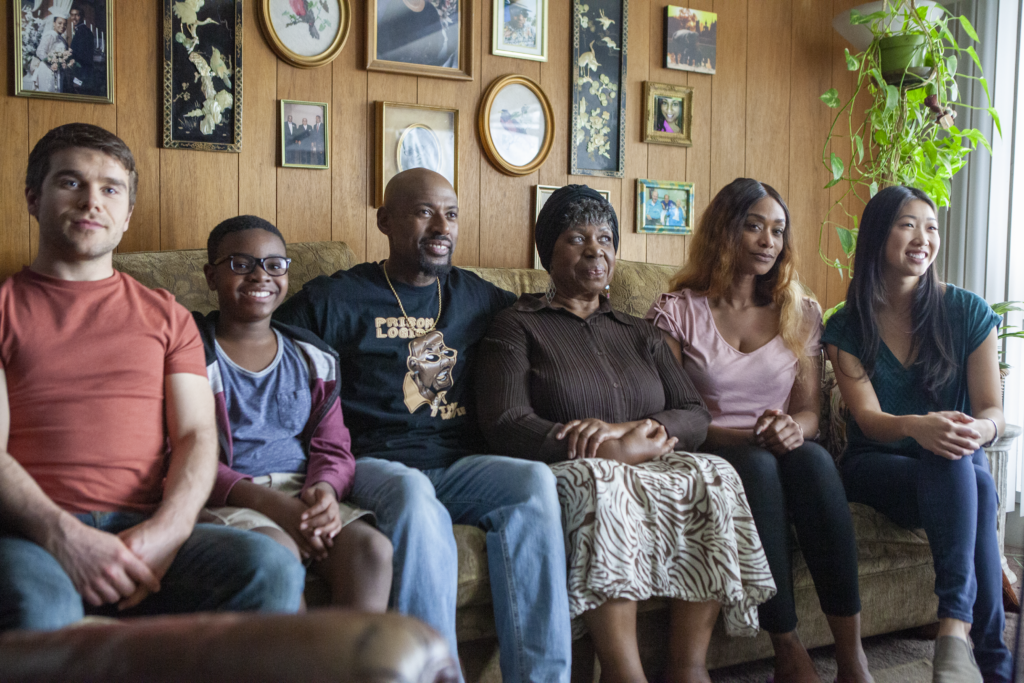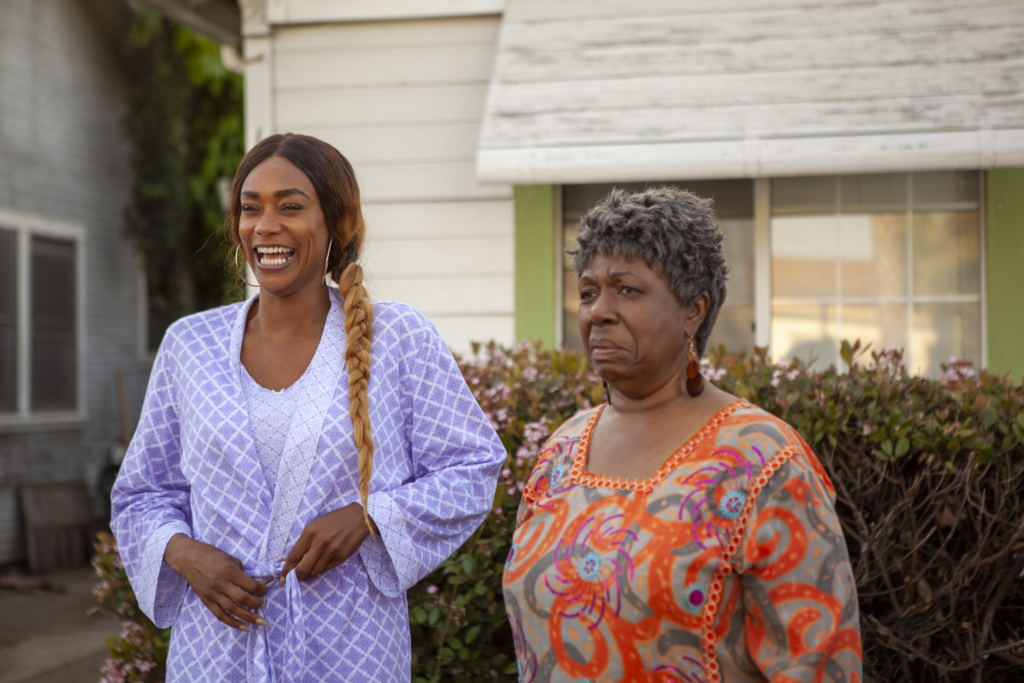Tami Roman talks new role ‘Tijuana Jackson: Purpose Over Prison’ and the importance of prison reform
Roman showcases her impeccable comedic timing and gives an understated performance that is relatable, honest, and brutally authentic in the flick

Tami Roman, one of the breakout stars of VH1 reality show Basketball Wives, brings her unique flavor to her latest project, an independent film titled Tijuana Jackson: Purpose Over Prison.
Roman showcases her impeccable comedic timing and gives an understated performance that is relatable, honest, and brutally authentic. The indie flick, which was written, produced and directed by Romany Malco, star of ABC’s A Million Little Things, tells the story of Tijuana Jackson, an ex-felon released from prison who becomes the subject of student film. TJ aspires to be a world-renowned motivational speaker and earn the respect of his family and probation officer Cheryl Wagner, played masterfully by Regina Hall.
Read More: Chris Rock on racism, protests: ‘Humanity isn’t progress’
Roman plays TJ’s frustrated sister Sharea Jackson, who doesn’t sugarcoat the truth and is unsympathetic about his predicament. While caring for their sick mother, Sharea is also raising a young son and she expects TJ to step up as a good representative for the family. When TJ resumes his usual shenanigans and she pointedly states, “[He’s] got his freedom but still operating on the outside like his ass is still in prison.”
Even when they are arguing over TJ’s old bedroom that Sharea occupies, TJ cries out, “Where am I supposed to sleep?” which she retorts “Sleep, I’m still waiting on you to wake the (expletive) up,” a clever double entendre that directs TJ to self-awareness, responsibility, and to develop into a man that takes control over his life.

The film is shot in a mockumentary style that allows the audience to journey with TJ along his arduous path rather than just be static observers. According to Roman, shooting the film as a mockumentary as opposed to a standard film narrative was Malco’s ingenious decision.
“When you [have a film that] talks about something as serious as prison reform, if you present it in a standard feature you could have a portion of the audience that feel like you’re preaching to them,” Roman explains. “Now they’ve got up a wall [and] they don’t receive the message. Romnay was a genius when he said I’ll make fun of the system and drop the gems in there where people, at first viewing, won’t even realize they’ve been taught something, and for me, I thought that was great.”
Watching TJ handle various situations definitely strikes a comedic cord; the element of humor does help to expose the truth of TJ’s quandary as he struggles to secure employment and find a place to live. The audience becomes cognizant of how ex-felons continue to be disenfranchised even after they are released from prison. The Sentencing Project states, “In 2010, 8 percent of all adults in the United States had a felony conviction on their record. Among African American men, the rate was one in three [or] 33 percent.” Upon one year after being released from prison, approximately 60 percent to 75 percent of ex-offenders remain unemployed as noted by the National Institute of Justice.
Ex-offenders need not only gainful employment and transitional housing, but also require the availability of a counselor or mentor to help prevent recidivism. Roman says the system needs to be restructured.
“There are no programs in place while they are incarcerated that prepares them to come out and feel [they have] a certain level of support that will lead them to be successful citizens in society,” she says. “As Romany showcases in the film [when you get out], there’s no transportation for you, your family might or might not be there, they’re just put out on the curb with no idea of how things are going to be better for them. There’s no training for employment, there needs to be a program that involves training and not insignificant classes that aren’t going to teach you anything. I am talking about stuff that will qualify them to go out and get employment in places that are not just the Wal-Mart.”

According to the Department of Justice, more than 650,000 ex-offenders are released from prison every year, and roughly two-thirds will likely be rearrested within three years of release. Once released, ex-felons usually return to communities that offer insufficient social support, live in impoverished and disenfranchised neighborhoods with high crime rates. As a result, former inmates often succumb to the same temptations that caused them to end up in prison initially. The journey for ex-felons towards reintegration is littered with personal, economic, and societal barriers that make adjusting back into society difficult especially since they are punished indefinitely for their offense. Roman believes that once a person has paid his/her debt to society their record should not follow them.
With the current protests occurring in our nation due to the police shooting of George Floyd and Jacob Blake, Black men with and without criminal records are particularly vulnerable of becoming victims of police brutality. Mainstream media, especially Hollywood, has been accused of helping to distort the image and realities of Black men, oftentimes to their detriment when relating to law enforcement. Negative racial tropes have often been used in films that refuse to portray Black men in the light of success or being good citizens.
Though the character of TJ is an African American ex-convict, he is not a one-dimensional caricature developed through the gaze of white dominance–allowing white people to remain comfortable within their bias and prejudices. Instead, Malco developed a humanized, nuanced character who displays humor, optimism, tenacity and insight, qualities not usually attributed to Black men in Hollywood films.
Roman believes that heads of development in Hollywood, lack the understanding of the storytelling that is necessary for Black America. She feels that Black creators have always been available to tell varied stories about the Black experience, however, maneuvering through the Hollywood machine has not been fruitful for them–mainly when trying to secure funding for production.

According to Roman, stories that are acceptable within the studio paradigm heavily center on the negative aspect of Black characters and are not indicative of what the entire African American community would like to see. The actress declares it can change if more African Americans were allowed in the boardrooms where projects can be given the green light.
She also finds fault with the African-American viewing audience that will continue to support Basketball Wives–that focuses on Black people arguing–but positive programming like Tia and Tamera that depicted a healthy family dynamic is short-lived.
Read More: Regina King unveils directorial debut ‘One Night in Miami’ at Venice Film Festival
“Hollywood, to me, has a narrative that is positioned where it seems we are troubled, we are conflicted, and we don’t know how to get our lives together. So when Hollywood sees you’re watching Love and Hip-Hop but you’re not watching Flex and Shanice, they feel that we don’t want to see it,” she says.
The viewing taste of the Black community does fluctuate, however. Roman believes showing support, despite the project, will allow more opportunities for Black content creators to tell engaging stories like Tijuana Jackson: Purpose Over Prison that centers on hope and redemption. The enduring message of the film, according to Roman, is, “At the end of the day your family is your family and you should never give up on the people that you love.”
Tijuana Jackson: Purpose Over Prison is currently streaming on iTunes, Apple TV, Amazon, Fandango, Google Play, Vudu, YouTube. For more information visit tijuanajackson.com.
Have you subscribed to theGrio’s new podcast “Dear Culture”? Download our newest episodes now!
